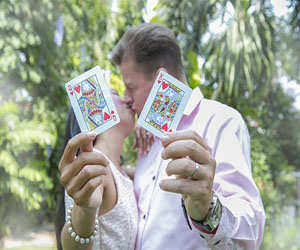


A Road To Connection And Understanding

Dating can be a challenging and often nerve-wracking experience, even for those without mental health concerns. For individuals who battle anxiety or depression, the journey can feel even more daunting. Coping with the emotional roller coaster of these conditions while attempting to establish romantic connections requires a unique set of strategies and considerations. In this article, we'll explore how to date with anxiety or depression, emphasizing the importance of self-care, communication, and self-compassion.
1. Self-Awareness Is Key
Understanding your mental health is a pivotal first step in dating with anxiety or depression. Awareness of your triggers, symptoms, and coping mechanisms empowers you to navigate the dating world more effectively. Recognize the times when your anxiety or depression may be exacerbated by dating-related stress and develop a toolkit to address these challenges.
2. Practice Self-Compassion
Dating with anxiety or depression often brings about negative self-talk and self-doubt. It's essential to practice self-compassion and treat yourself as you would a friend. Understand that it's okay to have difficult moments and that your mental health challenges do not define your worth.
3. Communicate With Your Partner
Effective communication is a cornerstone of any relationship, but it's even more vital when dealing with anxiety or depression. Be open about your mental health with your partner. Share your experiences and let them know what you need to feel supported. This can create a space of understanding and empathy.
4. Choose The Right Time To Share
While openness is important, you don't have to share your mental health history on the first date. It's a personal choice and should be done when you feel a deeper connection forming and trust has been established.
5. Boundaries Are Important
Setting and maintaining boundaries is crucial in any relationship, but it becomes especially important when dealing with anxiety or depression. Be clear about your boundaries and respect your partner's boundaries as well. This helps create a supportive and respectful environment.
6. Prioritize Self-Care
Prioritizing self-care is a foundational aspect of managing anxiety and depression while dating. Engage in self-care practices that soothe your soul, whether it's meditation, exercise, creative activities, or relaxation techniques.
7. Seek Support
Build a support network of friends and family who understand your mental health challenges. Reach out to them when you need to share your thoughts and concerns. Don't hesitate to seek professional help when necessary.
8. Focus On Quality, Not Quantity
Quality is more important than quantity when it comes to dating. Don't rush into a new relationship just for the sake of being in one. Concentrate on building meaningful connections and remember that rejection is a natural part of the dating process.
9. Be Open To Adaptations
Stay open to adapting your dating strategies as needed. If you find that certain dating situations or activities trigger your anxiety or depression, consider adjusting your approach to prioritize your well-being.
Dating with anxiety or depression is a unique journey that requires self-awareness, self-compassion, open communication, setting boundaries, self-care, and the support of friends and family. While dating can be challenging for anyone, these strategies can help individuals with anxiety or depression build meaningful, supportive, and fulfilling relationships. Remember that your mental health should always be a priority, and the right partner will support you in your journey towards well-being and connection.
The Search For A Soulmate
 The Quest For Wholeness
The Quest For Wholeness
The idea of finding your other half is rooted in the belief that, as individuals, we are not complete by ourselves. It proposes that there is a unique person out there who can fill the voids in our lives, emotionally and spiritually. This concept embodies the yearning for a deep, profound connection that transcends ordinary relationships.
The Search For A Soulmate
The search for one's other half is often associated with the idea of a soulmate. A soulmate is considered to be the perfect match, someone with whom we share a deep spiritual, emotional, and intellectual connection. This bond is believed to be so extraordinary that it feels like destiny when two soulmates cross paths.
Cultural And Personal Perspectives
The concept of finding your other half varies across cultures and personal beliefs. Some cultures place a strong emphasis on arranged marriages, where the idea is that two people are brought together by external forces and are meant to be together. In contrast, in more individualistic societies, there is a greater focus on personal choice and agency in finding one's other half.
The Deep Connection Beyond Words
 One of the defining features of a kindred spirit connection is the ease of communication. It's not just about talking, but about being truly understood without the need for elaborate explanations. These connections often involve shared silences, where words become unnecessary because both individuals understand each other's thoughts and emotions without the need for verbal confirmation.
One of the defining features of a kindred spirit connection is the ease of communication. It's not just about talking, but about being truly understood without the need for elaborate explanations. These connections often involve shared silences, where words become unnecessary because both individuals understand each other's thoughts and emotions without the need for verbal confirmation.
Kindred spirits are not solely limited to romantic relationships. They can be friends, mentors, or even family members. The key is the sense of familiarity and resonance that you feel when you're in their presence. These connections often develop organically, with individuals recognizing the unique chemistry and bond they share.
Navigating The Journey Of Lifelong Love
 Defining The Life Partner
Defining The Life Partner
A life partner is not merely a spouse or romantic partner, but a person with whom you share a deep and lasting commitment to navigate life's complexities together. It's a relationship built on trust, compatibility, and a shared vision for the future. The concept of a life partner encompasses both emotional and practical aspects, making it distinct from other relationships.
Building Trust And Commitment
One of the defining features of a life partner is trust. This trust is not just about fidelity but extends to a belief in each other's character and unwavering support. It's the knowledge that your life partner will be there in times of need, providing comfort and encouragement.
Commitment is the cornerstone of the life partner relationship. It's a promise to stand by each other's side, to weather the storms of life together, and to share the joys and triumphs that come your way. This unwavering commitment creates a sense of security and stability, fostering a deep emotional connection.
Compatibility And Partnership
Compatibility is crucial in a life partner relationship. It involves shared values, goals, and a mutual understanding of each other's needs and desires. Life partners complement each other's strengths and weaknesses, making it a partnership of growth and balance.
A life partner is not just a romantic interest but also a friend, confidant, and teammate. This partnership extends to all aspects of life, from raising a family to financial planning, from emotional support to making life's important decisions.
Nurturing Relationships That Transcend Surface
 Emotional Intimacy
Emotional Intimacy
At the core of a deep connection lies emotional intimacy. This is the ability to open up and share one's innermost thoughts, feelings, and vulnerabilities without fear of judgment. Emotional intimacy creates a safe space in which individuals can be their authentic selves, allowing them to connect on a deeply personal and meaningful level.
Shared Experiences
Deep connections often form in the crucible of shared experiences. Whether through the trials of life or joyous moments of triumph, these experiences shape the bond and add layers of depth to the connection. The memories created together serve as a testament to the strength of the relationship.
Intellectual Resonance
In addition to emotional intimacy, a deep connection may also encompass intellectual resonance. This means that individuals can engage in meaningful conversations, sharing ideas, thoughts, and perspectives on a level that stimulates and challenges their minds. The intellectual aspect of a deep connection allows for personal growth and the exchange of wisdom.
Trust And Vulnerability
Trust and vulnerability are the building blocks of a deep connection. It's the assurance that you can rely on the other person, confide in them, and expose your true self without reservation. The mutual vulnerability in a deep connection fosters an environment of acceptance and understanding.






Embracing Life's Exciting Moments
 Defining Thrilling Experiences
Defining Thrilling Experiences
Thrilling experiences can take many forms, from embarking on a daring adventure to trying something new, confronting a fear, or even savoring a simple, heart-pounding moment. What sets these experiences apart is the rush of excitement, the sense of being fully alive, and the feeling of pushing the boundaries of our comfort zones.
The Element Of Adventure
Adventure is often at the heart of thrilling experiences. Whether it's skydiving from dizzying heights, white-water rafting down tumultuous rivers, or exploring uncharted territories, the thrill of adventure lies in embracing the unknown. It's about stepping out of your comfort zone and into the realm of uncertainty, where the ordinary transforms into the extraordinary.
Overcoming Fears And Challenges
Thrilling experiences often require individuals to confront their fears and challenges head-on. This can include conquering a fear of heights, public speaking, or even social anxiety. The feeling of empowerment that comes from facing and surmounting these obstacles is an essential part of the thrill.
 Secure Attachment And Healthy Adult Relationships
Secure Attachment And Healthy Adult Relationships
A secure attachment in childhood typically results in healthy, balanced adult romantic relationships. Individuals who experienced a supportive and nurturing environment during their early years tend to have a strong sense of self-worth and are comfortable with both intimacy and independence in their relationships. These individuals are better equipped to build and maintain emotional connections based on trust, open communication, and mutual support.
Anxious-Preoccupied Attachment: The Quest For Intimacy
Childhood experiences that lead to anxious-preoccupied attachment can significantly affect adult romantic relationships. People with this attachment style often crave intense emotional connections but may struggle with trust and fear abandonment. They might become overly dependent on their partners, seeking constant reassurance and attention, which can lead to challenges in maintaining a healthy, balanced relationship.
Dismissive-Avoidant Attachment: Fear Of Vulnerability
Childhood experiences marked by emotional neglect or inconsistency can result in dismissive-avoidant attachment. In adult romantic relationships, individuals with this attachment style often maintain emotional independence and may avoid vulnerability. They may find it difficult to form deep emotional connections due to their fear of being hurt or rejected.
Fearful-Avoidant (Disorganized) Attachment: A Complex Mix
The fearful-avoidant or disorganized attachment style is characterized by a blend of anxious and dismissive tendencies. These individuals may have complex emotional connections in their adult relationships, making it challenging to navigate the ebb and flow of emotional intimacy and independence.
Healing And Nurturing Positive Emotional Connections
Recognizing the impact of childhood experiences on adult romantic relationships is a vital first step. To heal and nurture these connections, consider the following: